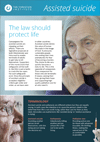Terminally ill patients should be allowed to commit suicide by turning down food and fluids, according to controversial new medical guidance.
The General Medical Council’s (GMC’s) guidelines, released today, have alarmed critics who see them as part of a creeping “culture of death”.
The guidance requires doctors to obey patients’ wishes even if this means that the patient refuses food and hydration which could prolong their life.
But critics have warned that food and water should be considered as care rather than medical treatment.
Artificially
And even if a patient requests to be artificially fed until the point of death a doctor can overrule their wishes if they believe the process is causing the patient harm or discomfort, providing they get a second opinion.
Dominica Roberts, Chairman of the Pro-life Alliance, cautioned: “Everybody has the right to refuse treatment.
“But feeding and hydrating a patient, even artificially, is not treatment, it is care.”
Require
The guidance also requires doctors to obey patients’ wishes expressed verbally and in ‘living wills’.
However, critics have warned that terminally ill patients who change their mind about treatment may be unable to communicate their new wishes.
Dr Peter Saunders, Chief Executive of the Christian Medical Fellowship, said: “We must beware of the danger of allowing a hastily drafted and ill-informed advance refusal to trump good clinical judgement.
Ignored
“Most people actually believe that there could be times when their best interests would be best served if clinicians ignored their directive.
“We trust therefore that the GMC will look kindly upon doctors who, for good clinical and ethical reasons and with the very best interests of the patient at heart, choose on occasions not to follow them.”
Doctors who flout the new guidelines could be struck off.
Death
But Julian Brazier, a Conservative MP, cautioned: “We are moving towards a culture of death.
“The idea that doctors should be punished for trying to save lives is horrendous.”
The GMC’s guidance states that “decisions covering potentially life-threatening treatments must not be motivated by a desire to bring about a patient’s death and must start with a presumption in favour of prolonging life.”
But it goes on to say that “there is no absolute obligation to prolong life irrespective of the patient’s views, if they are known or can be found out.”
Last year ‘living wills’ became a source of controversy after a young woman, who swallowed poison, used one to order doctors not to treat her.
Poison
Kerrie Wooltorton arrived at hospital after taking poison to kill herself, but was carrying what she said was a ‘living will’ asking not to be treated.
After consulting lawyers the hospital staff decided to abide by Kerrie’s request, despite the fact that she was severely depressed.
The doctors reportedly acted in fear of prosecution or losing their jobs if they treated her against her will because the Mental Capacity Act gives legal force to living wills.


